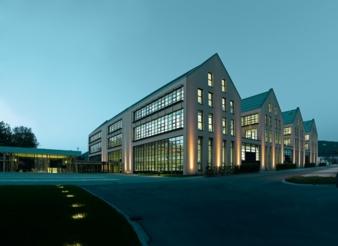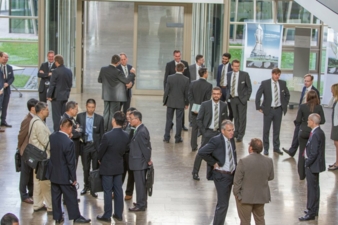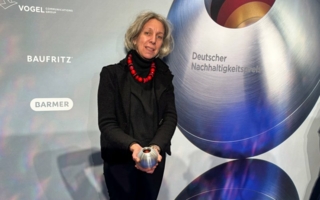13/09/2016 – TEZ – Technology and Development Centre — auf Deutsch lesen
Industry platform a complete success
The TEZ – Technology and Development Centre – was opened in 2010 as a platform for creating innovative perspectives and for shaping the future of the textile industry.
Requiring an initial investment of around EUR 60m, Groz-Beckert implemented its plan to construct a building and provide the industry with an unprecedented technology centre. Six years down the line, the first successes are emerging and are certainly not to be sneezed at. Ever true to its original principles, the centre has created important momentum in the field of research and development. The TEZ itself currently employs 280 staff and trains an additional 180 apprentices.
Knowing that the industry’s future depends on having highly skilled staff and experts, the company is committed to providing training in a wide range of technical trades, and fosters close contacts with universities specialising in textiles both at home and abroad. These include institutions such as the Universities of Applied Sciences in Albstadt-Sigmaringen, Reutlingen and Niederrhein as well as the North Carolina State University (NCSU), USA. Collaboration ranges from the joint supervision of Bachelor and Masters dissertations, jointly organised projects, lectures and courses to study periods abroad at the NCSU and scholarships. The TEZ is endowed with five fully equipped machine centres for textile production processes such as knitting, weaving, felting, tufting and sewing.
The centre has most certainly developed into a hub for Germany’s textile researchers, be they from Denkendorf, Aachen, Dresden, Chemnitz or Greiz. Results from the realm of pure research can be developed further at the TEZ to create new, collaborative textile projects. One such example is from the field of Textile Construction, which saw the formation of a Competence Centre in 2012, followed by the foundation of the Groz-Beckert subsidiary Solidian in 2013. This enabled the results obtained from pure research on textile-reinforced concrete at the RWTH Aachen University and the Technical University of Dresden to be implemented in an industrial context. In 2015, Solidian built the world’s first and, so far only pedestrian bridge from pure carbon concrete in Albstadt-Ebingen. The subsidiary has since clocked up several successes and has won numerous awards including the “NPCA Sustainability Award” for textile reinforcements and the “Innovation Prize of the Concrete Component Suppliers Industry”.
Working at the TEZ
How do the staff at the TEZ go about developing and improving products? Birte Kleefisch, Corporate Communications, provides the following explanation: “In a first step, three questions have to be answered: What happens to our products when in use? Can our products contribute to enhancing textile processes in certain applications? Can our products be used in any new textile applications? Next, we form a Competence Centre at the TEZ as a means of building or deepening our specialist knowledge. In a third step, the focus is on developing marketable innovations or on paving the way for new potential and improvements in efficiency.
In the best-case scenario, in one final step, the developments emerging from the TEZ create a new business field, which is then lifted out of the TEZ and transferred into a new company structure such as in the case of Solidian.”Groz-Beckert not only built the TEZ with a view to focusing on new products and business fields, but also to enhancing its own products. One such example is the Litespeed knitting needle and its further development into the Litespeed Plus. Birte Kleefisch: “Extensive tests and trials were carried out on the machines at the TEZ and the needle type was further developed.
The result is a knitting needle that helps reduce energy consumption by up to 20 percent.”Customer and joint projects also fall within the remit of the TEZ. For example, the TEZ has cooperated with the Stuttgart-based Institute for Lightweight Design and Construction (ILEK) within the framework of Project Arako, focusing on adaptive room acoustics and acoustic conditioning in construction. The objective of this interdisciplinary, state-sponsored project involving architects, acoustics specialists and textile technologists, was to develop an acoustically effective textile module for use as a building cover or envelope.
The result was a textile system made from polyester cloth and an acoustically effective non-woven. In order to test its suitability for applications in construction, a variety of physical and acoustic tests have been conducted, giving rise to some promising results. Should it be possible to reproduce the system on an industrial scale, textile building envelopes could well emerge as a promising product for the construction industry. Another project at the TEZ was charged with optimising costs particularly in the manufacture of composite parts based on textile structures. In cooperation with Groz-Beckert’s subsidiary, FTA – Forschungsgesellschaft für Textiltechnik Albstadt mbH and Schmuhl Faserverbundtechnik, based in Liebschütz, near Hof in Germany, work began on processing coarse reinforcement yarns to improve textile structures. The TEZ, FTA and Schmuhl Faserverbundtechnik joined forces to develop Leno-woven carbon NCFs (Non-crimp fabrics). The findings of the trials at Schmuhl were, in fact, so promising that that they were used for the production of patient couches.
Industry 4.0
Not surprisingly, the ubiquitous concept of Industry 4.0 is also tackled at the TEZ. Accordingly, the TEZ contributes to state-sponsored research projects, such as the “Knitting 4.0” study conducted by the ITV Denkendorf. The TEZ Auditorium creates the perfect setting for events and symposia of this kind. In April 2016, it hosted an Industry 4.0 event, organised by German textile association Südwesttextil in cooperation with the German Institutes of Textile and Fibre Research (DITF) and the Alliance of Fibre-based Materials (Allianz Faserbasierte Werkstoffe Baden-Württemberg e.V. - AFBW). Similarly, in spring 2016, the TEZ Auditorium was the chosen venue for the Textilbetontag (Textile Concrete Day), initiated by Solidian in collaboration with the Chamber of Architects in Baden-Württemberg. The main focus of the event was on presentations and discussions on textile concrete along with industrial examples.





